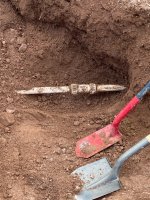Before I switched to SWG, too much CYA was always my nemesis--requiring draining my 20,000 gallon pool every year. I never had to add CYA when I'd refill it, as apparently there was a lot absorbed in the plaster (even new plaster) that would leach back out--plus the tricholor tabs would then continue to raise the CYA from there on out. Cost analysis was that it was slightly cheaper than using bleach and fighting rising pH with Muriatic Acid (even with a huge water bill); plus it was much more convenient and hands off maintenance... but I digress.
Now I'm running a salt water pool where the chlorinator likes to have between 3,000 to 4,000ppm salt.
The pool water looks great currently (better than ever when I was using trichlor), and I've yet needed to ever shock it as combined chlorine is never more than 0.5ppm higher than free chlorine.
Since the days are getting shorter and cooler, I checked my chlorine levels and my free and total chlorine levels indicated 10ppm. So, I cut my power output by half on the chlorinator. It wasn't complaining about low salt at all. However, when I measured my salt levels, they were down to 2800ppm--a drop of 600ppm in just one month!
When I last added salt in April, I had raised it to exactly 4000. In September it had dropped to 3400. So, it had a 600ppm drop in 5 months, then suddenly another drop by the same amount in a month's time.
I had raised my CYA to 60ppm at the beginning of June--never expecting it to ever go down... but measuring it lately, it's less than 30ppm (can't measure less without over-flowing the tube).
I took my water samples to two different Leslie Pool stores, where they gave me readings of 25ppm CYA and 2850ppm Salt...
Is this normal, or what would explain this loss?
Last time I backwashed the pool was in April. I've checked for pool leaks twice (bucket tests) and there doesn't seem to be any (thank goodness because I only just spent $15,000 to fix pool leaks last year).
Thanks for anyone's insight into this.
Now I'm running a salt water pool where the chlorinator likes to have between 3,000 to 4,000ppm salt.
The pool water looks great currently (better than ever when I was using trichlor), and I've yet needed to ever shock it as combined chlorine is never more than 0.5ppm higher than free chlorine.
Since the days are getting shorter and cooler, I checked my chlorine levels and my free and total chlorine levels indicated 10ppm. So, I cut my power output by half on the chlorinator. It wasn't complaining about low salt at all. However, when I measured my salt levels, they were down to 2800ppm--a drop of 600ppm in just one month!
When I last added salt in April, I had raised it to exactly 4000. In September it had dropped to 3400. So, it had a 600ppm drop in 5 months, then suddenly another drop by the same amount in a month's time.
I had raised my CYA to 60ppm at the beginning of June--never expecting it to ever go down... but measuring it lately, it's less than 30ppm (can't measure less without over-flowing the tube).
I took my water samples to two different Leslie Pool stores, where they gave me readings of 25ppm CYA and 2850ppm Salt...
Is this normal, or what would explain this loss?
Last time I backwashed the pool was in April. I've checked for pool leaks twice (bucket tests) and there doesn't seem to be any (thank goodness because I only just spent $15,000 to fix pool leaks last year).
Thanks for anyone's insight into this.


